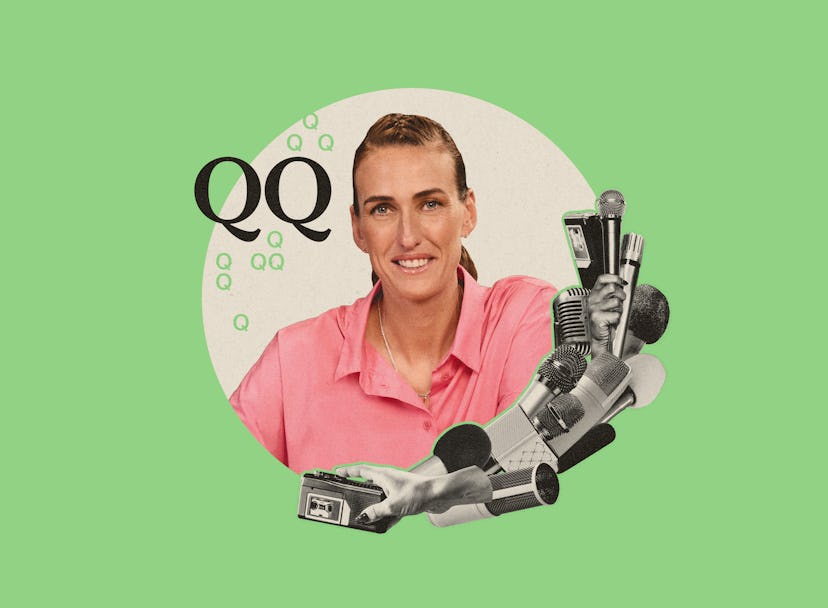Quick Question
Jill Scott Is Doing It For The Sporty Girls
“Break through those barriers and see what's on the other side,” says the footballer-turned-commentator.

Jill Scott has strings to her bow. Last year, the MBE-holding footballer helped England’s Lionesses bring home the country’s first international football trophy since 1966. In the same summer, she generated one of British sport’s most-memed moments (try and discuss the EUROs without “f*ck off, you f*cking pr*ck,” I dare you), was crowned Queen of the Jungle — and retired from professional football.
Despite hanging up her boots, though, Scott remains very much in the thick of it. When she’s not behind the counter of her Manchester coffee shop (set up in 2021 with partner, Shelly), she can be found mic in hand, sharing pearls of wisdom from her 19-year career for the likes of ITV and Channel 4.
Of course, holding the spotlight comes with its challenges — especially for women in sports broadcasting. This reality was underscored earlier this month, when Scott took part in Heineken’s The Social Swap with fellow pundit and former England player, Gary Neville. The pair shared opinions on each other’s social media accounts during a handful of the UEFA Champions League games, with the goal of comparing users’ reactions to see if content shared by male and female pundits was received differently.
The results were unsurprising. Neville’s posts under Scott’s username received five times the amount of sexist replies (e.g. “Get back in the kitchen”) than those shared by Scott on Neville’s page.
“I don't mind my viewpoints being criticized,” Scott says of her takes on sport, but “[disagreeing] shouldn't then [lead to] sexist comments or comments that are going to hurt your feelings.”
Bleak as the responses were, Scott tries to keep things in perspective — the comments section, after all, isn’t always representative of the wider world. “Social media shouldn't be a validation tool for your success,” she says. “Make sure that you're checking in with managers, coaches, family, friends, agents. The people that really matter.”
Below, Scott discusses how she made a career out of her passion, the best advice she’s received from colleagues, and the realities of working in a male-dominated field.
What is your favorite memory from your playing career?
It has to be the EUROs. That's probably an obvious one, but yeah, it has to be that EUROs win.
After joining Sunderland Women in 2005, your hobby became a job. How did you balance that?
The best way to describe it is, [before], football had to fit into life — but then I realized that life had to fit into football.
Walk us through the decision to move into punditry.
Punditry kind of just happened. To be honest, I don't know if it'll be something I do full-time. I'm really enjoying it. I had a little bit of apprehension because I've seen, especially female [broadcasters], when they're [covering] a men’s game they get a lot of stick on Twitter. So yeah, I was a little bit apprehensive about that. But I think if you don't put yourself out there, then you don't know if you're going to be able to do it. Also, I think if a young girl sees you doing it, it gives them that visibility and [shows them] that their dream can be a reality — that was one of the biggest reasons for doing it.
What's the biggest thing you've learned working in such a male-dominated field?
You just have to be brave, you have to keep putting yourself out there. You have to keep believing in yourself. There are a lot of male [sports broadcasters] who are very supportive as well, so I think sometimes you have to not overthink the situation and think people aren't going to help you, because they will. The first step is being big and brave really, and believing in yourself in order to prove yourself.
Were there any women in broadcasting you looked up to growing up?
Yes. When I was little, Gabby Logan, and definitely Claire Balding as well. Just watching them do broadcasting and presenting, I thought, “They’re amazing.” And you know what, since I've kind of done a little bit [of broadcasting] myself, I've realized how truly amazing they are because it's such a hard gig at times and they make it look so easy.
What is the best advice you've received from a fellow broadcaster?
That's a very good question. I think just forget the cameras are there, you’re just chatting football with your mates or with fellow pundits. In terms of social media, remember [don’t post anything] on there you wouldn’t shout out in the middle of a shopping center, because that's how many people are probably going to see your comments. They're probably two good bits of advice.
Just enjoy it, you get one life. Break through those barriers and see what's on the other side.
This interview has been edited and condensed for clarity.